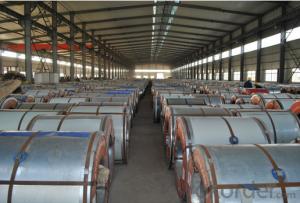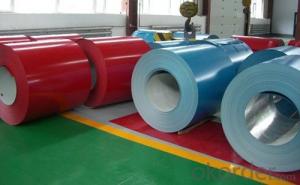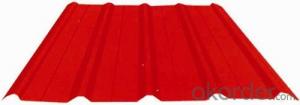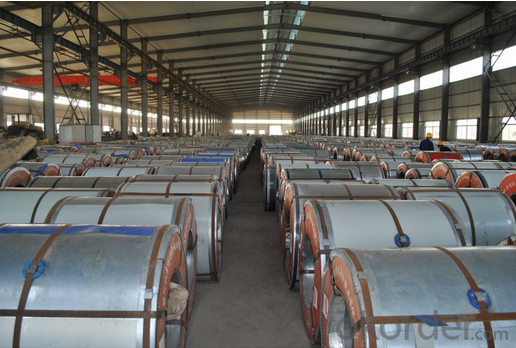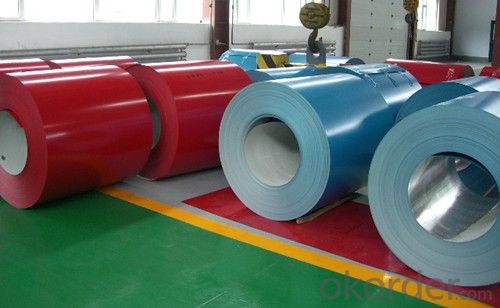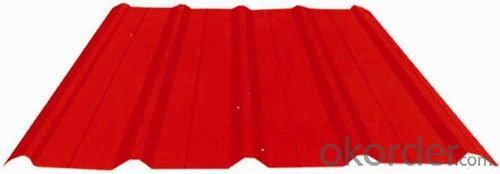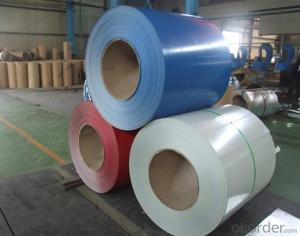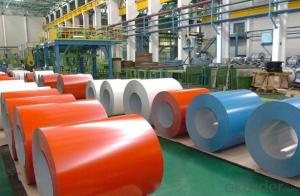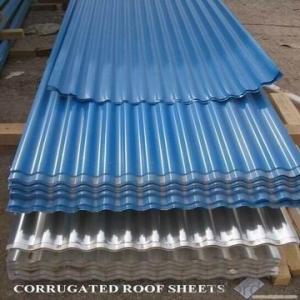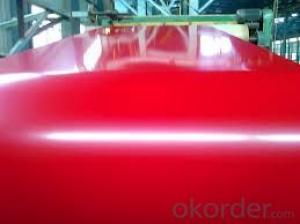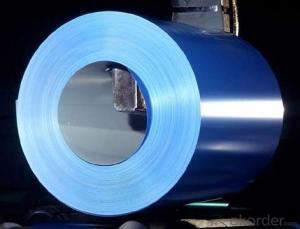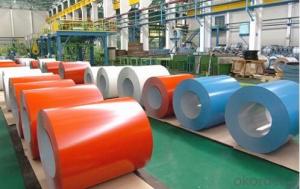Customized Color Coated Galvanized PPGI Steel Coil/PPGL Roofing Sheets
- Loading Port:
- Tianjin
- Payment Terms:
- TT OR LC
- Min Order Qty:
- 25 m.t.
- Supply Capability:
- 50000 m.t./month
OKorder Service Pledge
OKorder Financial Service
You Might Also Like
Customized Color Coated Galvanized PPGI Steel Coil/PPGL Roofing Sheets
1. Features:
. A strong anti-corrosion properties, good corrosion resistance. The use of hot dipped galvanized steel substrates for the Color Painted steel coil, with the exception of zinc have anti-corrosion layer, a layer of coatings have seized coverage and protection, allowing effective anti-rust products, galvanized coil about life than double.
. A good cold-formed molding processing, users can directly processed into finished products. Substituting wood to steel, easy to transport, and efficient construction, energy conservation.
2. Applications:
* Used as roof panel, wall panel in steel structure in warehouse,
factories exhibition hall container houses, cold storage
*It is also mainly used in light industry, automobile, construction,
animal husbandry, fishery and commerce, etc,
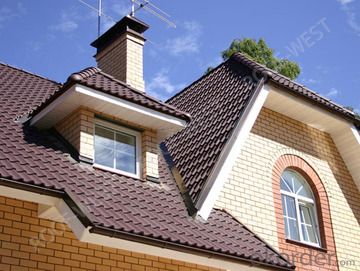
3.Product information:
| PRODUCT | Customized Color Coated Galvanized PPGI Steel Coil/PPGL Roofing Sheets |
| STANDARD | GB/T-12754: 2006, JIS330, ASTM A653, JIS G330, GB/T2518, ASTM A792, JIS G3321, JIS G3317 |
| BASE METAL | Hot dipped Galvanized steel sheet/coil, Hot dipped Galvalume steel sheet/coil |
| EQUIPMENT | Double coating double baking; three coating three painting |
| SUPPLY CAPACITY | 500,000 Tons per Year |
| SIZE | Thickness: 0.3mm-1.0 mm,thickness tolerance: +/- 0.02mm Width : 700mm—1250mm |
| ZINC COATING | 30g/m2-150g/m2 |
| PAINT THICKNESS | Top Side: 10-25 microns; Back Side: 4-8 microns |
| COIL WGT | Normally 5 Tons per Coil, aslo as required by customer |
| COIL ID | 508mm/610mm |
| SURFACE PAINT | EP, PE, HDP, SMP, PVDF |
4.Product Image:
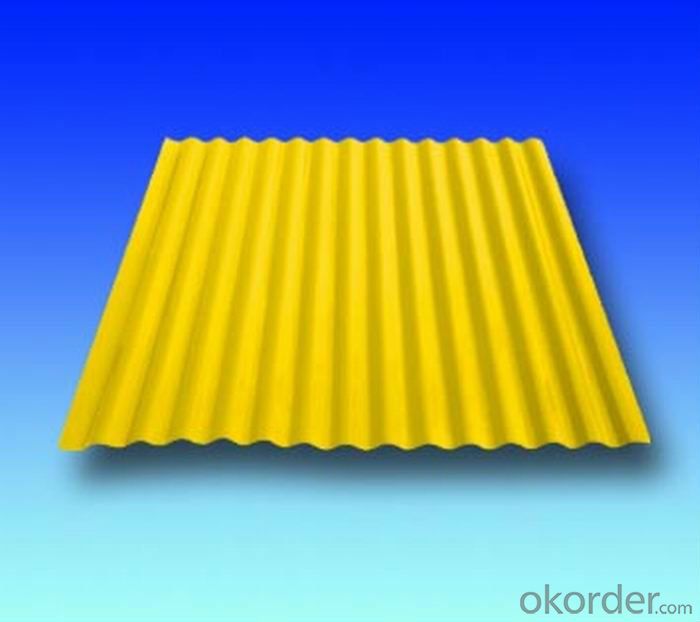
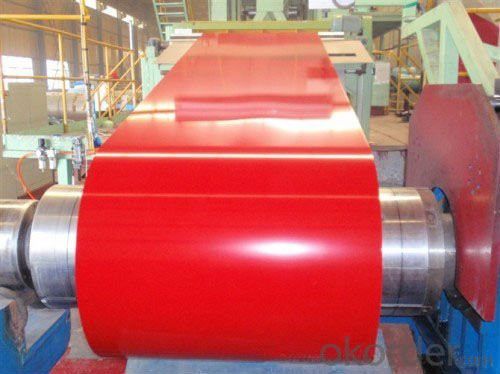
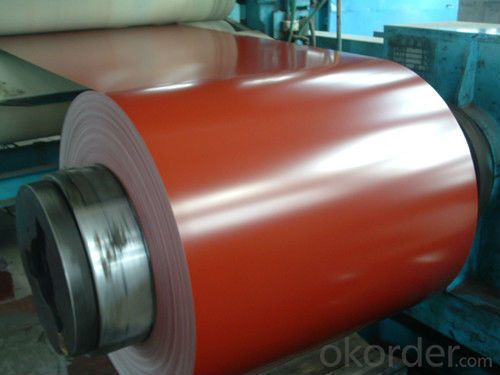
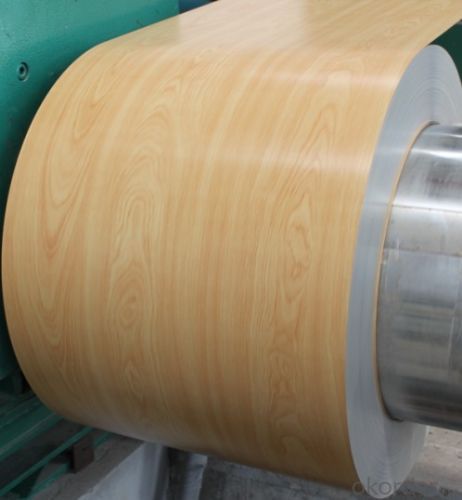
Proudction Line:
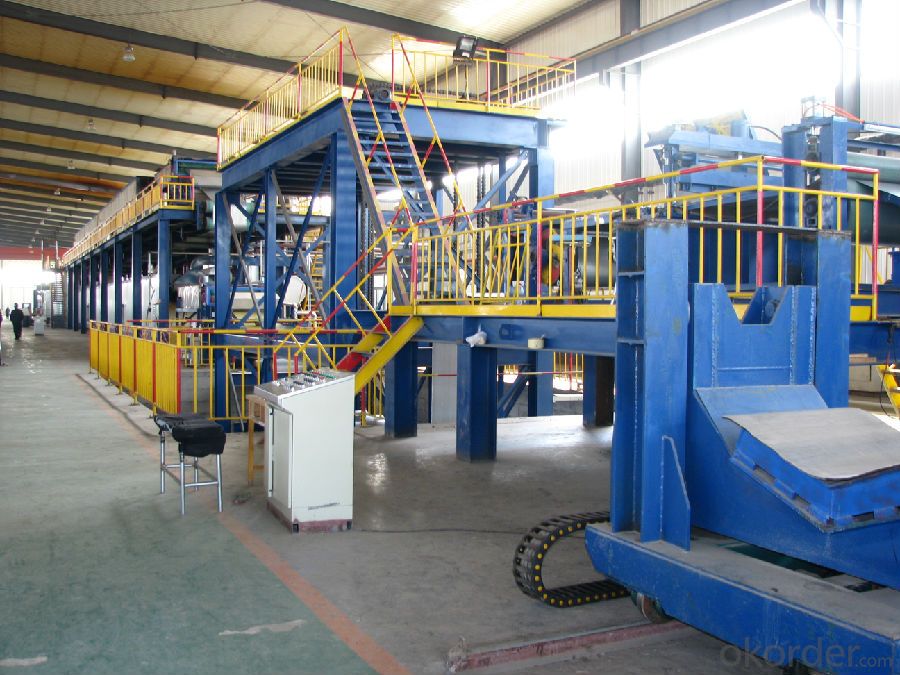
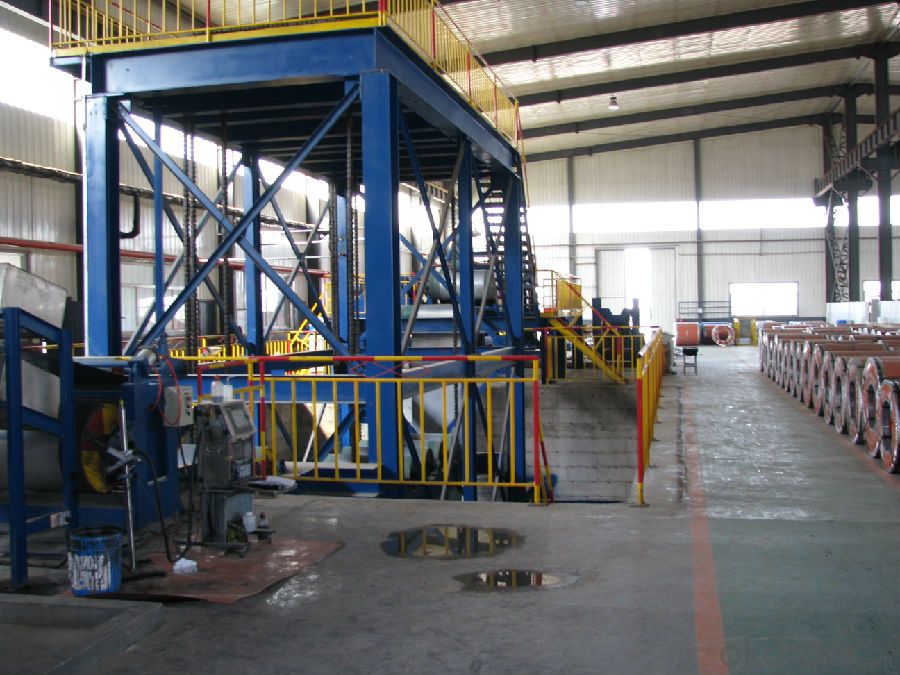
5.FAQ
We have organized several common questions for our clients,may help you sincerely:
①How about your Warranty?
Warranty: 1-Year for the whole light. Warranty is based on correct storage, installation, using and maintenanc
②How to guarantee the quality of the products?
We have established the international advanced quality management system,every link from raw material to final product we have strict quality test;We resolutely put an end to unqualified products flowing into the market. At the same time, we will provide necessary follow-up service assurance.
③How long can we receive the product after purchase?
In the purchase of product within three working days, We will arrange the factory delivery as soon as possible. The pecific time of receiving is related to the state and position of customers.Commonly 7 to 10 working days can be served.
- Q: How are steel coils used in the production of steel fasteners?
- Steel coils are used in the production of steel fasteners by being processed into flat strips or wires, which are then cut, shaped, and threaded to create various types of fasteners such as screws, bolts, and nuts. The coils provide a continuous supply of steel material that is easily manipulable and can be efficiently transformed into the desired shape and size for fastener production.
- Q: How can I tell the wear resistance, strength, ect from the name of the steel?how could I tell the difference between 420 and 440 steel. what does the HC in 420 HC steel mean? what do the numbers and letters in s30v steel mean?
- So what does all that mean in the real world of knives. 420 has very low carbon by blade standards, as such it is just junk steel. There are three grades of 440, A, B and C. The amount of carbon in A is about half of what C has. (carbon is what makes steel get hard). Iron is very much like a sponge in that it can absorb and hold different alloys. These alloys give the iron different attributes, and they can magnify each other. Like a sponge iron can only hold so much, for Chromium it is around 13%. At that point the steel becomes stainless. The drawback is a loss of strength. As a bladesmith my knives are generally 59 to 60 rch, 420 and 440 at its hardest is 59 but at that it is brittle so most makers draw it down to around 57. In my test a knife made of 420 couldn't make 5 slicing cuts through rope (most couldn't make one). 440 averaged between 5 and 10. Compared to the lowest grade of carbon steel I use (5160) which average between 25 to 30 on the same rope. I have tested many stainless blades and the rule always the same, the more chromium past 13% the weaker the blade and the less edge holding ability.
- Q: How are steel coils processed at the steel service centers?
- Steel coils are processed at steel service centers through a series of steps to transform them into finished products that meet the specific requirements of customers. The process typically begins with the arrival of the steel coils at the service center. These coils are typically large and heavy, and may have been produced by a steel mill or imported from overseas. Once the steel coils are received, they are typically inspected for quality and any defects. This ensures that only high-quality coils are used in the production process. The coils are then stored in a warehouse until they are ready to be processed. Next, the steel coils are uncoiled. This involves unwinding the coil to create a flat sheet of steel. This can be done manually or using automated machines depending on the size and thickness of the coils. The uncoiled steel is then leveled to remove any residual stress and ensure a flat and consistent surface. After leveling, the steel sheets may undergo various processes depending on the desired end product. These processes can include cutting, shearing, slitting, and forming. Cutting and shearing involve cutting the steel sheets into specific sizes or shapes. Slitting involves cutting the steel into narrow strips, while forming involves bending or shaping the steel into the desired form. Once the desired processing operations are complete, the steel sheets are often treated with surface finishes to enhance their appearance or protect them from corrosion. These finishes can include painting, coating, or galvanizing. Finally, the processed steel sheets are inspected for quality again to ensure they meet the required specifications. They are then packaged and ready for shipment to customers, who may use them in various industries such as construction, automotive, or manufacturing. Overall, the processing of steel coils at steel service centers involves a combination of inspection, uncoiling, leveling, cutting/shearing/slitting/forming, surface finishing, quality control, and packaging. This process allows for the transformation of steel coils into finished products that are tailored to meet the specific needs and requirements of customers.
- Q: How do steel coils contribute to the marine vessel construction industry?
- Steel coils are essential components in the marine vessel construction industry as they play a crucial role in the fabrication of various structural elements of ships and boats. These coils are typically made of high-quality steel and are used in a variety of ways to contribute to the construction and performance of marine vessels. Firstly, steel coils are utilized in the construction of the hull, which is the main body of the ship. The hull requires strong and durable materials to withstand the harsh conditions of the sea, including waves, corrosion, and impacts. Steel coils provide the necessary strength and integrity to the hull, ensuring the vessel's structural integrity and safety. Moreover, steel coils are also employed in the fabrication of decks, bulkheads, and other internal structures of marine vessels. These components are crucial for dividing the ship into compartments, providing stability, and supporting various equipment and machinery. Steel coils are known for their excellent tensile strength, which allows them to bear heavy loads and resist deformation, making them ideal for constructing these vital components. Additionally, steel coils are used in the construction of propulsion systems and other mechanical parts of marine vessels. These coils are often shaped and formed into specific components, such as shafts, gears, and propellers, which are critical for the vessel's propulsion and maneuverability. The high strength and durability of steel coils ensure the reliability and efficiency of these mechanical systems, enabling smooth navigation and operation of the vessel. Furthermore, steel coils contribute to the marine vessel construction industry by enhancing the overall safety and longevity of ships and boats. Steel is known for its resistance to corrosion, which is a significant concern in marine environments due to the presence of saltwater. By utilizing steel coils, marine vessels can withstand the corrosive effects of seawater, reducing the need for frequent maintenance and repair. This, in turn, improves the lifespan of the vessel and reduces the risk of accidents or failures at sea. In conclusion, steel coils are indispensable in the marine vessel construction industry. These coils provide the necessary strength, durability, and resistance to corrosion, ensuring the safety, performance, and longevity of ships and boats. From the construction of the hull to the fabrication of internal structures and mechanical components, steel coils play a vital role in every aspect of marine vessel construction.
- Q: How long do steel coils typically last?
- Steel coils typically last for several decades, with an average lifespan ranging from 20 to 30 years. However, the actual durability and lifespan depend on various factors, such as the quality of the steel, the environment it is exposed to, how well it is maintained, and the frequency of use.
- Q: What are the dimensions of steel coils used in the furniture industry?
- The dimensions of steel coils used in the furniture industry can vary, but common sizes range from 0.5 to 3 millimeters in thickness and 100 to 2000 millimeters in width. The length can be customized based on specific furniture manufacturing requirements.
- Q: My boyfriend says he has balls of steel.
- it is extra of a euphemism than actuality. somewhat the testicles are somewhat gentle and may even herniate or rupture; it somewhat is why they cover those balls of steel with athletic cups earlier they actually take the sector.
- Q: What type of metal is T10 tool steel?
- Carbon Tool Steel usually in the form of forged bar stock. Steel Grades for tool steel can be any of the following (depending on the application) T10/1.1645 SK3/SK4/W1A-91/2/ TC105/y10/1880/BW1B T10A/1.1545/y10A/1880 Standards are published by: DIN, JIS, ASTM, AISI, BS, SS, ISO, TOCT, GB Doug
- Q: Where can a find a steel scrubber. Its great to clean cooking vessels. Would be great if someone gives me an idea. I did not find it at CVS, but was in a hurry, will try again tomorrow.
- they sell something like what you are talking about at grocery stores called a chore boy. They are where they see sos pads and sponges.
- Q: How do steel coils contribute to the sustainability of construction projects?
- Steel coils contribute to the sustainability of construction projects in several ways. Firstly, steel is a highly durable and long-lasting material. Steel coils are manufactured to withstand extreme weather conditions, corrosion, and other external factors, making them ideal for construction projects that require strength and longevity. This durability reduces the need for frequent repairs and replacements, thus minimizing waste and resource consumption over time. Additionally, steel coils are recyclable. At the end of their lifespan in a construction project, steel coils can be easily and efficiently recycled. This process requires less energy compared to the production of new steel, resulting in reduced carbon emissions and environmental impact. Moreover, the recycled steel can be used in various industries, including construction, further promoting sustainability and resource conservation. Furthermore, steel coils contribute to the sustainability of construction projects by offering design flexibility. Steel is a versatile material that can be easily shaped, cut, and molded into different forms and sizes. This allows for efficient construction practices, reducing material wastage and optimizing resource utilization. Additionally, the lightweight nature of steel coils allows for ease of transportation and installation, further reducing fuel consumption and associated greenhouse gas emissions. Lastly, steel coils contribute to the sustainability of construction projects through their energy efficiency. Steel is an excellent conductor of heat and electricity, making it ideal for energy-efficient buildings. Steel coils can be used in the construction of walls, roofs, and other components that help to insulate buildings and reduce energy consumption for heating and cooling. This results in lower energy bills for the occupants and reduces the overall carbon footprint of the construction project. In conclusion, steel coils contribute to the sustainability of construction projects through their durability, recyclability, design flexibility, and energy efficiency. By using steel coils, construction projects can reduce waste, conserve resources, minimize environmental impact, and optimize energy consumption, thus promoting a more sustainable and environmentally friendly approach to construction.
Send your message to us
Customized Color Coated Galvanized PPGI Steel Coil/PPGL Roofing Sheets
- Loading Port:
- Tianjin
- Payment Terms:
- TT OR LC
- Min Order Qty:
- 25 m.t.
- Supply Capability:
- 50000 m.t./month
OKorder Service Pledge
OKorder Financial Service
Similar products
Hot products
Hot Searches
Related keywords
